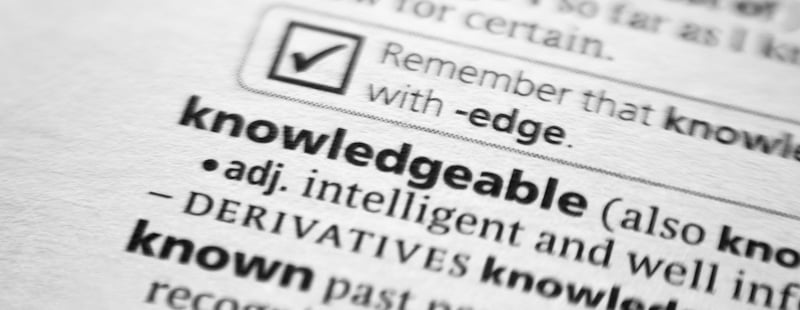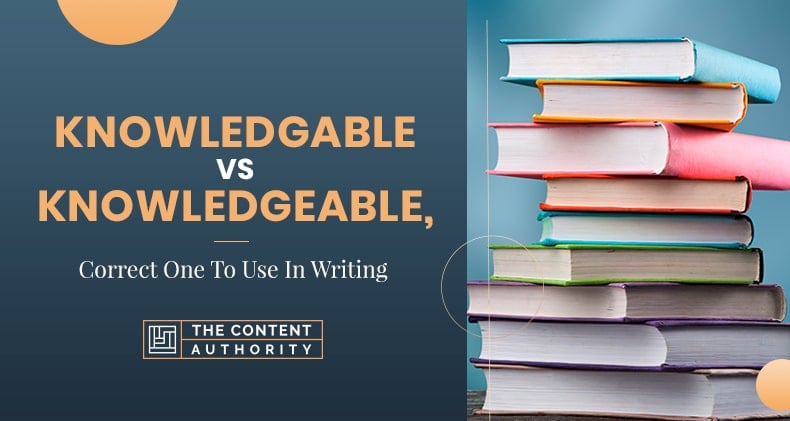In the English language, multiple words can be considered hard to spell. One of those words is “Knowledgeable” because of the number of characters it contains. This situation, for example, leads to multiple incorrect spellings like knowledgable, knowlegable, knowledgible, knowledgeble, and others. In this article, we will present the definition of the correct spelling “knowledgeable,” the origin of the word, and other aspects related to the term.
Knowledgeable is the correct spelling of the word. On the other hand, Knowledgable is a variant of the spelling. It is less commonly used and sometimes considered wrongly spelled. Because all the information is under the spelling knowledgeable, we need to recognize this form as the correct one.
Definitions
Let us go ahead and establish a clear definition of the word knowledgeable. The word knowledgeable is used to refer to someone that has the ability or the capability of understanding and dominating a certain amount of information and subjects.
There are multiple ways or sources that someone can acquire knowledge and become knowledgeable. Sources like testimony, education, practice, experience, pure curiosity, scientific inquiry, and many more can help someone become knowledgeable. The study of knowledge in a philosophical manner is called epistemology.

The main characteristic of knowledge is that it can be implicit or explicit. Implicit knowledge is the one that is obtained with experience and is linked to practical skills. On the other hand, explicit knowledge is where a theoretical understanding is needed, and a proper education process needs to occur.
The philosopher Plato famously pointed out the need for a distinction between knowledge and genuine belief in the Theaetetus, leading many to attribute to him a definition of knowledge as “justified true belief.”
Origin of the word
The word knowledge has its origins in the Greek word, Gnosis. This term means understanding and knowing something by observing that and by the experience of past situations.
The form knowledgeable comes from the middle English verbal sense adding the section “able” to it. This addition is to have a word that can describe someone that possesses knowledge.
Types of knowledge?
There are multiple types of knowledge, and usually, the typography of them is based on how the knowledge is obtained.
Scientific knowledge
This type of knowledge is made on the beliefs of the scientific method. By applying the scientific method, people can determine if something is real (yes, the reality is subjective, but still). By formulating a question or a doubt, we establish a hypothesis. By applying the scientific method, we understand through experimentation if the question or doubt we created is true or false.
Situated knowledge
This type of knowledge is not based on a scientific method. This type of knowledge refers to the one obtained in a specific situation. It defends that there is no other way to get that knowledge if someone does not live in that particular situation.
However, on the other hand, situational knowledge can be seen as individualistic because only the one person living a situation could adequately understand it. Therefore, situational knowledge is, in theory, very contradictory because each individual could experience similar problems and have entirely different learnings from the same experience.
Partial knowledge
This type of knowledge is basically the acceptance that there is no form to obtain a complete domain of any subject. Partial knowledge is to know that even when you dedicate your entire life to learning something, you will never be able to dominate it entirely. Therefore, your knowledge will always be incomplete.
Partial knowledge is part of the concept of bounded rationality. In a rational being, it has to be clear that the limited amount of time someone has is directly related to the limited amount of information someone can obtain.
Synonyms
Every language has different ways to say the same thing. This section will present other words that hold identical meanings as the term knowledgeable.
- Appreciative: means someone capable of showing appreciation for the things that surround them.
- Brilliant: means someone that shows great intelligence. It is said of someone that displays a tremendous amount of talent regarding a specific matter.
- Conscious: is something that can be said about anyone that shows awareness of what is around them.
- Perceptive: having an understanding of any given situation is considered a keenness of insight.
- Smart: means having an agile mind; it is someone that shows excellent mental capability.
- Sophisticated: Usually, this term references someone who is highly educated and with experience in multiple subjects.
- Insightful: someone capable of looking and seeing more than what others typically see or pay attention to.
- Intelligent: this term refers to someone that has a good understanding of any subject and is quick to interpret those subjects.
- Informed: someone that is prepared due to the search for information.
- Wise: someone with the power of knowledge and can discern situations due to experience and that knowledge.
Antonyms
Just as it is common to hear words that essentially mean the same thing, some words have the opposite meaning. The name for this is an antonym. Next, we will present a list of words that mean the opposite of knowledgeable.
- Dull: used to describe someone that is not sharp or that has a lack of intelligence.
- Foolish: someone that is easily manipulated and lacks wisdom.
- Ignorant: this term describes someone unaware, usually by choice, of what is happening around them.
- Inexperienced: someone that has not lived in enough situations to acquire knowledge from them.
- Unacquainted: means someone that is not familiar with another one or another thing.
- Senseless: someone that lacks the composure to demonstrate appreciation and comprehension of any given situation.
- Unaware: used to describe someone that is not conscious of their surroundings.
- Uninformed: someone that lacks information or the desire to obtain information.
- Unintelligent: lack of intelligence or knowledge.
- Unknowledgeable: someone that does not show or exhibits the ability to understand and perceive.
Examples of the word
This section will present multiple sentences that will serve as examples using the term knowledgeable.
- Friendly and knowledgeable are the qualities we look for in our staff.
- My brother’s lawyer is very famous because he is very knowledgeable and has a lot of experience.
- Whenever you want to get a good wine recommendation, you need to go to a wine merchant, and they usually are knowledgeable and willing to help you.
- She has worked with plants her entire life; saying she is knowledgeable is an understatement.
- She works at an art gallery because she is very knowledgeable when it comes to the arts.
- Michael is very knowledgeable about combustion engines.
- The customer service team is very knowledgeable.
- He is a jazz lover, and he is very knowledgeable about it.
- Some people are just more knowledgeable than others.
- King Arthur was considered fears but knowledgeable.
- The band Queens became very knowledgeable about music because they liked to experiment with multiple things.
- The group of workers in this building was very knowledgeable, and I did not have to tell them twice what to do.
- To keep a horse healthy, you need to do knowledgeable and regular checkups on their feet.
- It is not always the ones with the most prominent degree, the most knowledgeable one; people can surprise you.
- To become knowledgeable about something, you need to put the effort first, and there are multiple resources to gain knowledge.
Conclusion
As we can conclude, the English language has words within its vocabulary that can be considered hard to spell. Some words are more complicated to spell than others because of the number of characters a word has. Also, maybe the combination of letters makes it difficult.
We see this clearly with the word “knowledgeable” because of the number of letters and the combination of consonants and vowels. Therefore, it has a lot of room for wrongly spelling it.
Regardless of the difficulty of spelling it correctly, the correct way to write the term is as “knowledgeable,” any other spelling should be considered wrong.
Shawn Manaher is the founder and CEO of The Content Authority. He’s one part content manager, one part writing ninja organizer, and two parts leader of top content creators. You don’t even want to know what he calls pancakes.


